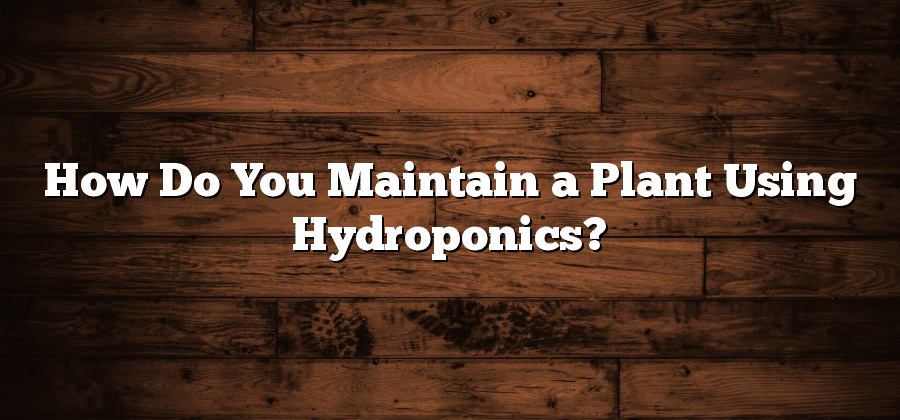Choosing the Right Hydroponic System
When it comes to selecting a hydroponic system, there are several factors to consider. One important aspect is the size of your space. If you have limited space, a vertical hydroponic system may be the ideal choice as it maximizes your growing area. On the other hand, if you have a larger space, a horizontal hydroponic system could be more suitable.
Another crucial factor to consider is the level of automation you desire. Some hydroponic systems have automated features such as timers and sensors that regulate the watering and nutrient delivery process. These systems provide convenience and help ensure optimal growth conditions for your plants. However, if you prefer a more hands-on approach, manual hydroponic systems are available as well. These systems require more effort on your part, but they offer the flexibility to adjust the settings according to your plant’s specific needs.
Selecting the Ideal Plant Varieties
One of the key factors in achieving success in your hydroponic garden is selecting the ideal plant varieties. This requires careful consideration and research to ensure that you choose plants that will thrive in a hydroponic system. When selecting plant varieties, it is important to consider their growth characteristics, nutritional requirements, and ability to adapt to a soilless environment.
Firstly, consider the growth characteristics of the plants you are interested in growing. Some plants, such as lettuce or herbs, have a relatively short growth cycle and can be harvested within a few weeks. On the other hand, plants like tomatoes or peppers take longer to reach maturity and require more space and resources. Assessing the growth characteristics will help you determine the appropriate size and number of plants to grow in your hydroponic system.
Secondly, **nutritional requirements** play a crucial role in selecting the ideal plant varieties. Different plants have varying nutrient needs, and it is important to ensure that you can provide the necessary elements in the hydroponic environment. Some plants have higher nitrogen requirements, while others may need more phosphorus or potassium. Understanding the specific nutrient requirements of the plants you wish to grow will help you create a tailored nutrient solution for optimal growth and yield.
Lastly, the ability of plants to adapt to a soilless environment is an important consideration. Not all plants are well-suited to grow hydroponically, so it is crucial to choose varieties that have proven success in soilless systems. Look for plants that are known for their adaptability and ability to thrive without the support of soil. This will increase the likelihood of achieving success in your hydroponic garden.
By carefully selecting the ideal plant varieties based on growth characteristics, nutritional requirements, and adaptability, you can maximize the productivity and success of your hydroponic system. Remember, each plant variety has unique needs – a thorough understanding of these requirements will help you make informed decisions and achieve optimal results in your hydroponic garden.
Providing Proper Lighting for Growth
Lighting is a crucial element in hydroponic systems as it directly impacts the growth and development of plants. Proper lighting ensures that plants receive the necessary amount of light energy for photosynthesis. When selecting lighting for your hydroponic setup, it is essential to consider the specific light requirements of the plant varieties you plan to grow.
Different plant varieties have varying lighting needs, including the intensity, spectrum, and duration of light exposure. Some plants thrive under high-intensity lights, while others prefer lower levels of light intensity. Additionally, the spectrum of light, including different colors, such as blue and red, plays a crucial role in plant growth. It is important to research the specific lighting requirements of your chosen plant varieties to provide them with the optimal lighting conditions for healthy growth.
To create the perfect lighting environment for your hydroponic system, it is recommended to use specialized grow lights, such as LED or fluorescent bulbs. These lights are designed to emit the appropriate spectrum of light that plants need for photosynthesis, without producing excessive heat. Additionally, LED lights are energy-efficient, making them an eco-friendly choice for indoor gardening. By investing in quality lighting equipment and ensuring that it is properly installed, you can provide your plants with the ideal light conditions they need to thrive in your hydroponic system.
Creating the Perfect Nutrient Solution
To achieve optimal plant growth in a hydroponic system, it is essential to create the perfect nutrient solution. This solution will provide all the necessary elements and minerals required for the plants to thrive. The nutrient solution must be carefully balanced to ensure the right concentrations of essential nutrients, such as nitrogen, phosphorus, and potassium. Furthermore, it is crucial to monitor the pH level of the solution regularly, as different plants have specific pH requirements for optimal nutrient uptake.
In addition to the basic nutrients, micronutrients also play a crucial role in plant growth. These include iron, manganese, zinc, and copper, among others. While they are required in smaller quantities compared to macronutrients, their absence can lead to nutrient deficiencies, affecting plant growth. Therefore, incorporating a micronutrient mix into the nutrient solution is vital to support healthy and vigorous plant development. It is important to note that the composition of the nutrient solution may vary depending on the specific plant varieties being cultivated. Proper research and understanding of the nutrient requirements of each plant species are essential for creating the perfect nutrient solution.






